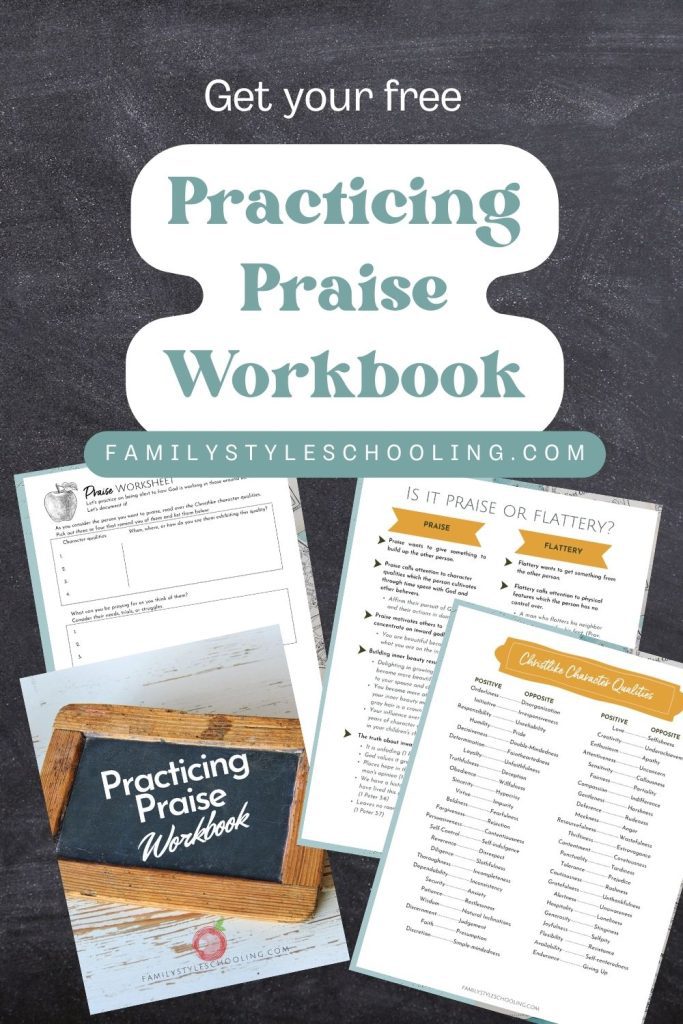How to Encourage a Wholesome Learning Environment in Your Home
One of the trendy words among the young people in my life is “wholesome.” When a movie or TV show feels like it encourages virtuous behavior, they refer to it as “wholesome.” As I’ve been processing different work environments and looking back at my homeschooling journey, this concept of cultivating a wholesome learning environment has become even more compelling.
Guard the Learning Environment
As parents or lead learners, we have the unique authority to guard the learning environment that our children experience. This is not a new concept. Paul shared this idea with the Ephesians as he noticed how easily they could break the unity of the gathering. In Ephesians 4:29, he instructs, “Do not let any unwholesome talk come out of your mouths, but only what is helpful for building others up according to their needs, that it may benefit those who listen.” This verse gives us several principles for interacting with one another that can help us build a beautiful learning environment wherever we are.
PRINCIPLE #1 - Words Matter
Paul describes a toxic learning environment as one where “unwholesome talk” prevails. He tells us not even to let any of it come out of our mouths.
Picture this: You have a simple piece of printer paper sitting in front of you. If you were to describe that paper using unwholesome talk, some insults might be:

- Basic
- Unimaginative
- Boring
- Lightweight
- Simple
- Common
With every derogatory descriptor, you would be essentially shredding the paper. It’s really easy to shred paper. When you can’t see the beauty in printer paper, it’s easy to come to these vulgar conclusions.

Vulgar Language Lacks Imagination
The word “vulgar” is also an interesting one, derived from the Latin vulgus, which means common people. The idea reminds me of the Smurfs. When they describe something, they say, “Well, that was the smurfiest smurfing thing I ever did smurf.” Today, when someone uses vulgar language, it just means they lack a broader vocabulary to express themselves clearly.
When Jerome translated the Bible into Latin, he used vulgar Latin so that the common people could read it, and it became known as the “Vulgate.” He wrote his translation in the familiar language of the time so that the average person could read and understand the Bible without knowing Greek or Hebrew.
Jerome’s translation was basic or unsophisticated. He did this to meet the needs of under-educated people. Their use of the word vulgar didn’t mean offensive or obscene—simply common. Jerome still believed that the original languages provided a richer understanding of God’s Word.
Wonder Brings Rich Vocabulary
If we took a minute to be in awe of printer paper, we might appreciate those seemingly mundane qualities:
- Basic becomes humble. It serves the user’s purpose and doesn’t draw extra attention to itself.
- Unimaginative - hardly! Can you put those shreds back together so that you can’t see any tears? This tiny piece of writing material is an engineering marvel!
- Boring. Are you starting to see the miracle of ingenuity packed into this thin sliver of writing material? I mean, even the fact that it is…
- Lightweight stands not as a weakness or defect but represents the wonderful creativity and problem-solving that went into making something as thin as
- possible before it would break. We can actually carry these around in large stacks without breaking a sweat. Moses carried tablets of stone.
- Simple—well, there is nothing simple about it. Do you see the wood grains from the trees used to produce this product? No. That’s impressive to me.
- Common—creating identical replicas is pretty challenging. I’m sure the machine making these treasures is good at doing the same thing over and over, but there was a designer behind the machine. Someone had to tell the device how to make that happen and find a way to do it efficiently and effectively. The fact that it is common is a blessing, not a condemnation. Your senior thesis or resume might have a different impact if every page of the document was printed on slightly different sheets of paper!
Do you see the idea? The simple act of shredding a piece of paper is a great object lesson for families that struggle with “unwholesome talk.” Pass out a piece of paper and see how easily they can shred it. Now see who can put it back together. It’s easy to shred.

This object lesson isn’t meant to present a hopeless scenario, but it is intended to enlighten us about the power of our words and maybe to seek a better way to speak to one another. The good news is that there is a better way.
PRINCIPLE #2 - Be Intentional With Your Words
Paul doesn’t just lead with what not to do without giving us the other side of the argument. While we avoid unwholesome talk, we are to let a different kind of talk come out of our mouths: “...what is helpful for building others up according to their needs.”
Hurting Others Hurts Ourselves
I don’t think building others up is a standard practice in our society. Classmates compete with one another for the top grade. Athletes go head-to-head with their teammates for more playing time or a better position. Musicians contend for the highest chair in the orchestra or to get the solo in a concert. In playing society’s game, we lose sight of how to build one another up in the process.
Prior to Ephesians 4:29, Paul highlights the futility of thinking autonomously. He explains that selfish living demonstrates a darkened mind—a mind lacking understanding because it has been separated from God (Ephesians 4:17-19). “But that’s not how we were taught,” Paul says (v. 20). We must renew our minds to put on the new self.
Why is it important to lift others up? It matters because we are one. Paul instructs: “Therefore, each of you must put off falsehood and speak truthfully to your neighbor, for we are all members of one body” (v.25). Truthful words demonstrate God’s truth about your neighbor. When we speak hurtful or degrading words to one another, we ultimately hurt ourselves.
Words that Build Up
Let’s face it. Negative qualities of people are generally easier to see than positive qualities. One practice that my dad modeled well for me was writing notes of encouragement. He regularly wrote letters to students in his 6th grade Sunday school class, and as you can imagine, he often found he needed to be creative in finding ways to encourage them.
He created a guide for helping identify positive qualities to praise, listing 49 Christlike character qualities. If he saw the slightest hint of one of those qualities in action, he would affirm God working in their life. If he identified negative attributes, he would use those to encourage the opposite qualities in someone’s life.
With this tool, you can easily find both something to praise and something to encourage. For example, if you have a child that shows great patience but tends to be unaware of what’s going on, you might say: “When you waited for your siblings to get their shoes on before you went outside, you demonstrated great patience! Stay alert to watch for the Lord to move as you wait for Him!”
If you need help thinking of these qualities, download this free character qualities sheet.
Our job is to build up others around us. We encourage them towards godly living; the stronger they are, the stronger we become together. Encouragement returns upon our investment exponentially. It blesses the community as well as the individual.
PRINCIPLE #3 - People are Listening
The last part of Paul’s instruction often gets overlooked, but it is an integral part of building a wholesome community. At the end, he adds a little purpose statement: “that it may benefit those who listen.”
Anyone within listening range becomes part of the conversation whether they want to be or not. Have you ever overheard an argument or heated discussion that made you uncomfortable? What about hearing grumbling or complaining? It’s hard not to get sucked into that trap. Without even asking for it, you become part of the interaction. Paul says that we are to consider these innocent bystanders in our speech.
When I first met my husband, I was impressed. As the worship leader at our Campus Crusade gatherings, he appeared to be a man of God, and I went into alert observation mode to see if his life matched his claims. One of the most remarkable things I noticed about him was how he talked with his friends. Even if they were harsh in their joking or teasing, he would never engage in that kind of speech. His words were kind and encouraging all the time. Because he didn’t let that unwholesome talk come out of his mouth, he blessed those around him without even knowing it.
“But this is just how we talk with each other”
Some might argue that their joking or sarcasm is just how they talk to each other, and they understand it, so it isn’t a problem for them. While I love quick wit, healthy relationships grow on firm foundations of clear truth-speaking. My family shouldn’t always wonder if I’m being honest with my words or if I slipped into a passive-aggressive joke to get my point across.
Paul addresses this idea to the Corinthians concerning their freedom in eating or drinking various foods. He doesn’t argue about the cleanliness of the food but the message they communicate when they eat or drink it:
“So whether you eat or drink or whatever you do, do it all for the glory of God. Do not cause anyone to stumble, whether Jews, Greeks, or the church of God—even as I try to please everyone in every way. For I am not seeking my own good but the good of many, so that they may be saved.” (1 Corinthians 10:31-33 NIV)
Ask yourself these questions before giving complete freedom to your jokes and sarcasm:
- Is this glorifying to God? God created humor, so sometimes the answer can be yes!
- Does this cause anyone to stumble?
- Am I looking out for my own good or the good of others?
These questions challenge me to keep a tighter watch on my desire to ease the tension in a room with humor.
But what if they need correcting?
Getting sucked into a trap of over-correcting is easy when you’re frustrated with someone. In Practicing Affirmation, Sam Crabtree uses Beever’s Grid to help decide when to correct and when to let things go.
Is it important?
First, decide the importance of an issue—is it a life-and-death situation? Sometimes we get sucked into correcting things that are on a personal preference level and not of great importance.
For instance, when my husband and I were newly married, he left his socks on the floor wherever he took them off. This drove me crazy! However much it bothered me, no one would die from his socks laying on the floor. To use my correction power in this situation would exhaust it on unnecessary problems.
I could (1) just pick up the socks that bother me and overlook the offense or (2) bring up the issue as something to discuss. This second option isn’t a correction, but rather an opportunity to share my preferences so that we might get on the same page.
If you avoid these little corrections, then when an important issue arises, your words will hold more weight because you have saved the alarm for a good cause.
Am I right?
The second question to ask is: “Am I right?” When my husband got a job at a new church, we were invited over for dinner by one of the couples we met. When I walked into the house, the host said, “Hello, Becky!”
Well, my name is not Becky, so I corrected him: “It’s actually Betsy.”
He responded with, “I was sure it was Becky!”
This response surprised me because I’m pretty sure that I hold a 100% guarantee of being right in this situation. Can you imagine if a virtual stranger knew the answer to that question better than the one walking around with that name for 40 years?
This minor correction was not a life-or-death issue, but it might have been for our relationship if I had let him continue to call me the wrong name!
Crabtree’s advice is to “reserve your conflict, your arguments, and your persistent corrections to issues that are important, and for which there is virtually no possibility that I will be shown to be mistaken.” And he advises keeping those things to a minimum.
We’ll only enjoy the fruit of correction when we choose our battles wisely.
The Fruit of a Wholesome Learning Environment
When we take the time to guard the learning environment, we cultivate the opportunity for fruitful learning in other ways:
- Safety builds trust. Your kids and/or students will trust that you believe in them and become more open to your instruction. Additionally, they won’t fear their siblings or peers if they’re confident that you’re protecting the learning environment. Deeper relationships will have room to grow in this context and create learning opportunities you could never provide by yourself.
- You accomplish more. If someone consistently disrupts the learning, your progress will suffer. Correction and policing your home or classroom takes a lot of time. When peace permeates the learning environment, you just get more done.
- Conversations linger on topic longer.
- Questions can be asked for clarity of understanding without fear of looking dumb.
- Partnership in learning becomes possible.
How you speak to one another is one of many components of healthy relationships, but it is a great place to start. It is so important to remember that our words do matter. We should be intentional with our words to build others up because people are listening.
Make sure to get this free guide to practice praising others!
Betsy Strauss is an unexpected homeschooler, mother of three, who is in a relationship with a sweet man for life. She loves reading books, drinking coffee, and learning anything with her kids.





Pearls of wisdom greatly appreciated!
So glad to hear that! Blessings!
[…] quality and enhance pregnancy rates in younger women as properly. The supplement works well with a wholesome environment. In case you are pregnant, take any medications, or have been diagnosed with a medical situation, […]